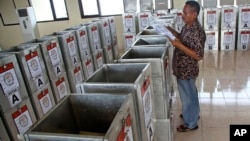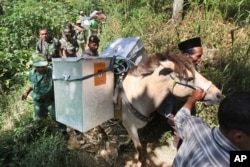Voters in Indonesia, the world's third largest democracy, head to the polls July 9 to choose a new president in a race described as one of the tightest in recent history.
Some 190 million Indonesians, including about 67 million first-time voters, will choose between two candidates with very distinct leadership styles: one is a former general with ties to ex-dictator Suharto and the other is the Jakarta governor considered to be a "man of the people." Both men are vying to replace President Susilo Bambang Yudhoyono, who has served the maximum two-term limit.
Frontrunners
Former Army General Prabowo Subianto is a fiery speaker whose campaign has centered on nationalism. The son of a noted economist and former government minister is admired for his firmness, a quality supporters say is required to maintain unity in a sprawling archipelago that is home to hundreds of different ethnicities and cultures. Prabowo was briefly married to the daughter of former dictator Suharto, the country's second president, who held power for 31 years until his resignation in 1998.
Although Prabowo has struggled to shake off claims of past human rights abuses, he has surged in the polls since March, closing in on his opponent's 30-point lead.
Jakarta Governor Joko Widodo, known by his nickname Jokowi, was raised in a village in the Central Java town of Solo. He is admired for overcoming an under-privileged upbringing to become governor and has attracted support for his man-of-the-people leadership style.
Jokowi's willingness to tackle the capital’s troubles and his reputation for clean governance have given him an edge with voters who find it refreshing that he has no ties to Suharto-era politics.
Recent survey
A poll conducted in early July by the Indonesian Survey Circle puts Jokowi slightly ahead (3.6 percent) of Prabowo.
The poll found 8 percent of voters remain undecided about which candidate they prefer.
Some analysts speculate the undecided voters will determine the outcome. But political analyst Yohannes Sulaiman believes the deciding factor will be turnout.
“Of course, it is back to the voter's turnout and in this case Jokowi has the advantage because his voters are more energized," Sulaiman said.
In the 2009 presidential election, 27 percent of voters abstained.
Logistics
To reach some of the most inaccessible parts of the country, ballots have reportedly been distributed by helicopter, boat, and even on horseback.
Authorities are deploying soldiers and police to protect polling stations and maintain order.
According to Central Jakarta Police Chief Hendro Pandowo, they will be on the lookout for a wide variety of issues and election day threats such as mass mobilization of dissatisfied people, intimidation and fake identity cards.
Voters are being advised to be on the lookout for any indications of electoral fraud, while more than 30,000 soldiers have been deployed to provide security.
Polls open at 7:00 am and close at 1:00 pm. A quick count is expected by late afternoon. Official results are expected to be released in late July.





